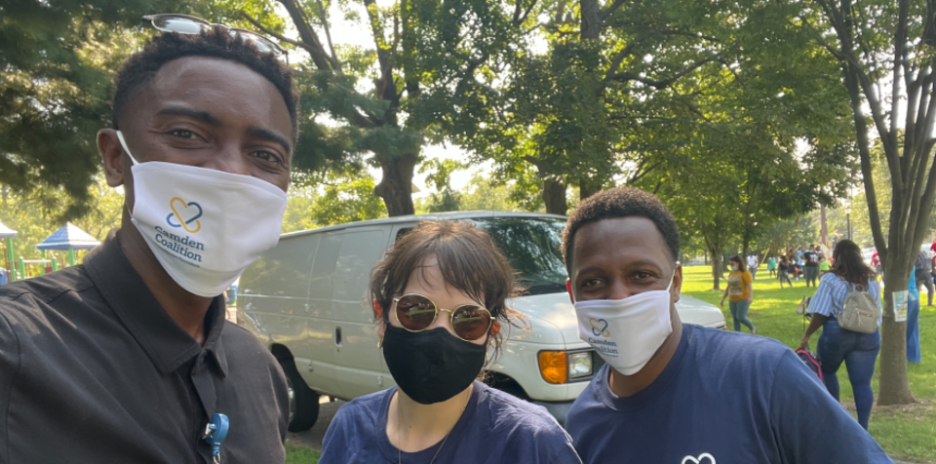Get Involved

 Become a Thought Partner
Become a Thought Partner
Partner with us to produce thought leadership that moves the needle on behavioral healthcare.
 Other options to get involved
Other options to get involved

Thank you!
We received your information and will be in contact soon!
Get Involved

 Grantmaking
Grantmaking
We fund organizations and projects which disrupt our current behavioral health space and create impact at the individual, organizational, and societal levels.
 Participatory Funds
Participatory Funds
Our participatory funds alter traditional grantmaking by shifting power
to impacted communities to direct resources and make funding decisions.
 Special Grant Programs
Special Grant Programs
We build public and private partnerships to administer grant dollars toward targeted programs.
 Program Related Investments
Program Related Investments
We provide funds at below-market interest rates that can be particularly useful to start, grow, or sustain a program, or when results cannot be achieved with grant dollars alone.
Get Involved

 Alyson Ferguson, MPH
Alyson Ferguson, MPH
Chief Operating Officer
Contact Alyson about grantmaking, program related investments, and the paper series.
 Samantha Matlin, PhD
Samantha Matlin, PhD
Senior Learning & Community Impact Consultant
Contact Samantha about program planning and evaluation consulting services.
 Caitlin O'Brien, MPH
Caitlin O'Brien, MPH
Director of Learning & Community Impact
Contact Caitlin about the Community Fund for Immigrant Wellness, the Annual Innovation Award, and trauma-informed programming.
 Joe Pyle, MA
Joe Pyle, MA
President
Contact Joe about partnership opportunities, thought leadership, and the Foundation’s property.
 Bridget Talone, MFA
Bridget Talone, MFA
Grants Manager for Learning and Community Impact
Add some text here

Authors: Leigh Wilson-Hall, Associate Director, Clinical Redesign Initiatives; Mouy Van Galen, Senior Program Manager, Clinical Redesign Initiatives; Matthew Kalamar, Director, Grants & Development
There is a need to help people get connected to behavioral health treatment
Across the United States, many individuals with mental and behavioral health conditions face barriers to accessing outpatient, community-based treatment, due to lack of insurance or inadequate coverage, stigma, or simply because it is so difficult to find an appointment quickly or easily. In New Jersey, where the Coalition does most of its direct care work, recent statewide data showed that the majority of patients who report a mild or moderate mental illness and a third of individuals who report a serious mental illness do not receive treatment. This can lead to poor health and wellbeing, and also means individuals are more likely to seek care in the emergency department (ED).
The Camden Coalition is a community-based nonprofit working to improve care for people with complex health and social needs through direct care work and clinical redesign work in South Jersey, and through training, technical assistance and coalition-building across the country. In 2016, we launched the National Center for Complex Health and Social Needs, funded by the Robert Wood Johnson Foundation, to create a home for the field. In South Jersey, the Camden Coalition operates within a vast ecosystem of community-based behavioral health providers, federally qualified health centers, and health systems, many of whom are members of our Coalition. All of us agree that there is a need for better coordination between our services to get patients connected to timely, patient-centered, outpatient behavioral health and community care.
Pledge to Connect: A behavioral health transitions of care pilot
The Camden Coalition has deep experience supporting individuals in navigating fragmented health and social systems as well as helping providers to redesign their clinical workflows and the ways in which they integrate. Our 7-Day Pledge initiative (2014-2019), for example, sought to reduce readmissions for recently hospitalized individuals by connecting them to primary care follow-up within seven days of discharge. This initiative was a partnership across Camden primary care practices and the Coalition and was a success, effectively reducing 30- and 90-day readmissions, and offered a model for strengthening other critical transitions of care from acute to outpatient settings.
Launched in 2021, our Pledge to Connect initiative aims to apply the 7-Day Pledge model to a high-stakes transition of care from the ED to outpatient care for individuals who have presented in the ED with a behavioral health need. This collaborative initiative between the Camden Coalition, Certified Community Behavioral Health Clinics, local health systems, and community-based organizations seeks to identify patients at the time of their ED visit, and connect them with and refer them to existing community-based behavioral health services, with the longer-term goal of ensuring care is accessible – way before an emergency visit might need to occur. The project began as a pilot between the Camden Coalition, Oaks Integrated Care, and Cooper University Health. The design involved testing two workflows—one in-person and one telephonic—that embed a behavioral health navigator employed by a local integrated behavioral health organization into the ED to provide timely, in-person support to patients with behavioral health needs. We began to scale the program region-wide in 2022.
Early analysis highlights success of in-person engagement at the time of an ED visit
To date, Pledge to Connect has conducted outreach to over 3,000 patients, testing a variety of avenues, including face to face behavioral health navigation, substance use navigation, and telephonic follow-up by the Camden Coalition’s care management team. The most important success of the project so far has been the engagement rate of patients who meet with a Certified Community Behavioral Health Clinic navigator right in the ED and prior to their discharge, which prevents loss to follow-up. From July 2022 through June 2023, 71% of patients engaged with services, 97% of whom had a behavioral health appointment scheduled and 41% of whom attended. The engagement rate of patients who received follow-up in person was 95%, demonstrating the importance of embedded co-located services when possible.
Another key finding was that our program has disproportionately reached patients of color (62% of patients outreached) compared to the general population of Camden County (40%). While ongoing analysis is needed in the second year of our work expanding with partners, these initial findings were recognized with a SAMHSA Behavioral Health Equity Award for its effective outreach and engagement method with racial and underserved population.
Finally, in addition to our impact on connecting patients to behavioral health, our project has had a positive effect on emergency department teams who provide critical care to so many individuals. Prior to Pledge to Connect, individuals who were not experiencing an acute psychiatric emergency that required inpatient treatment would be discharged with a list of clinics and told to call and try to make an appointment. Now that connections to outpatient care are being made prior to discharge, teams feel they are doing more for their patients. As a Coalition that has worked closely with health systems for many years, it was particularly meaningful to be able to support our colleagues providing critical, frontline care for patients in our own community. In the words of our ED provider partners:
Pledge to Connect “gave hope and still does to the trainees and all the providers that work in the ED because now we feel like we have something to offer a patient, and we really feel best when it’s that in-person meeting.”
“Overall, the project has been incredibly successful because patients are getting connected to care much more efficiently than has ever happened in the past.”
Next steps for our work
As we enter year three of Pledge to Connect, we continue to see that the major barriers to behavioral health access are difficulty finding and making appointments. If we could wave a magic wand right now, we would have one central, regional scheduling system to capture behavioral health appointments. To address this barrier, we have incorporated strategies into the project to increase access to community-based behavioral health patients across the region. More specifically, we are working with community-based behavioral health programs to input updated program information into My Resource Pal, the Camden Coalition’s findhelp-powered resource directory to make it easier for individuals and navigators to schedule behavioral health appointments.
As we look forward, our goal is to further strengthen implementation of clinical and regional strategies. With this in mind, our focus will be on continued analysis of program outcomes, defining sustainability plans, and developing an implementation guide to support others in developing innovative pathways to improve behavioral health transitions of care from the emergency department to community-based resources.










